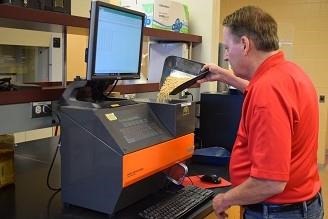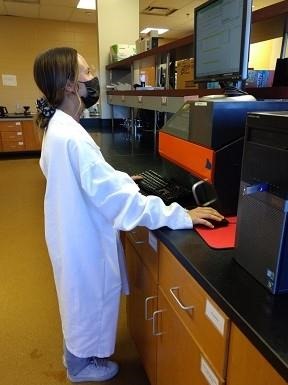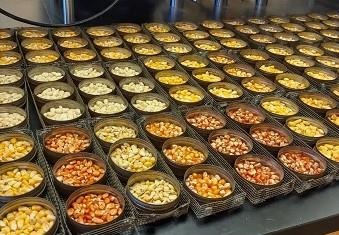By Chris Kick
All corn is not the same, soybeans are not all the same and not all wheat is wheat. At least not in Iowa State University’s Grain Quality Lab.
Tests performed inside the lab determine the protein, oil, starch and fiber content of popular grains grown in Iowa and across the Midwest. The lab can also test for functional value of certain grains, or how they might hold up for different uses, in addition to amino acid testing.

The lab is part of the Iowa Grain Quality Initiative with Iowa State University Extension and Outreach and its specialists help measure the “nutritive value” of grains, going beyond the standard testing done at most grain elevators today.
“Score-keeping for grain handling” is how Charlie Hurburgh describes the lab’s services. Hurburgh is professor in charge of the Iowa Grain Quality Initiative and manages the lab, alongside Connie Hardy, Extension Agriculture and Natural Resources program specialist.
“There is a value proposition in all of the different qualities or traits, and for the most part, it isn’t being captured very well by the commodity marketing system, which treats everything the same,” he said. “Consumers worldwide are getting more sophisticated and grain processors are seeing some real market opportunity to purchase outside the traditional generic commodity system.”
Specialized testing
Plant breeders and genetic companies, ethanol producers, livestock feed companies and some human food processors rely on the lab’s services for testing.
According to Hurburgh and Hardy, ethanol producers usually want softer corn that is high in starch, and lower density. On the flip side, livestock producers usually prefer high-protein, dense grain that is less powdery and dusty.
“It’s a matter of preference, based on what the grain is going to be used for, and seed companies are coming up with genetics to match the demand,” said Hurburgh.
In a typical year, the lab performs tests for 50-60 clients who may have a couple samples each, or several thousand. Most clients are small and medium size companies who do not have their own laboratories for testing, although farmers occasionally bring their own samples if they have a concern or want to know how their grain performs.
Team effort
In addition to Hurburgh and Hardy, the lab is run by graduate and undergraduate students. The staff also help calibrate grain testing equipment used by other laboratories – at other universities and private companies.

The primary testing technology is near-infrared spectroscopy. The grain is gravity-fed through the machines, where a near infrared lamp provides the appropriate spectrum for analysis. Results are produced in a minute or less and are displayed on a computer monitor or a digital screen.
The lab maintains strict confidentiality of samples and results, protecting the proprietary investments of the people and companies who use the lab. Services are for all grains and are priced on a per sample basis, with some exceptions based on the size of samples and the combinations.
The lab is also used for research related to grain quality and grain quality testing, and maintains an extensive library of grain samples that grows with each test. It’s what Hurburgh calls “integrated extension and research.”
Making a difference
Because the testing is often proprietary, Hurburgh and Hardy don’t always know what clients do with the results or how the results are being applied. But based on the number of return clients and anecdotal evidence, they are confident the lab’s services are making a difference.
“The extension specialist is listening to the industry and taking what they hear to work to help solve the puzzle,” said Hurburgh. “One of the more satisfying things for me is that we have become closely integrated with the grain handling and processing industry and the people who make it happen.”
In addition to Iowa State, Hurburgh serves on the board of the Grain Elevator and Processing Society and is a leading voice on grain handling logistics and best practices.
Hardy enjoys knowing that the work done in the lab is making a difference in the industry.
“Our work is technical enough that it’s challenging, but it’s also an applied science that resonates with the industry,” she said. “I also enjoy working with our many clients, because I know that the things we learn in the lab are being applied by the industry.”

Other services
While the lab is a big part of the Iowa Grain Quality Initiative, Hardy and Hurburgh and Erin Bowers, an affiliate assistant professor in Agricutural and Biosystems Engineering at Iowa State, also provide training to grain handlers designed to meet the requirements of the federal Food Safety Modernization Act. In addition, Hurburgh provides expert advice to farmers, cooperatives and the feed industry, regarding current trends and rapid response resources to mitigate time-sensitive issues.
The Grain Quality Initiative is also helping to organize the construction of the Kent Corporation Feed Mill and Grain Science Complex, being built on the Iowa State campus. This state-of-the-art facility is scheduled to be in use in 2023, and will provide teaching, research and extension opportunities, while also producing feed for Iowa State’s livestock farms.
Source : iastate.edu